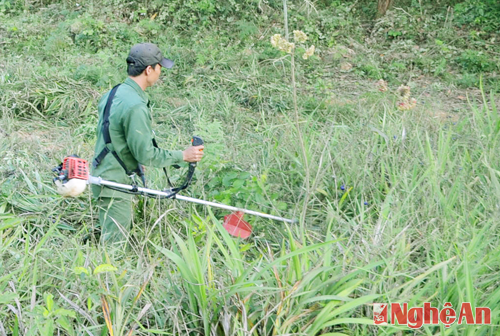The incense root tree on Cao Son land
(Baonghean) - Not only famous for the Nghe An brand of Gay tea, in recent years, Cao Son (Anh Son) has also promoted the strength of the aromatic root tree on the hill garden land. This is a new crop in the crop structure that is prioritized for economic development, helping people to escape poverty.
 |
| Mr. Nguyen Trong Chin in hamlet 4, Cao Son commune harvests incense roots. |
Visiting Cao Son in the right season, people here are harvesting the agarwood root. This year, people are excited because the agarwood root has just been planted but has a good harvest and good price. Since 2006, Mr. Nguyen Trong Chin - Hamlet 4, Cao Son commune has converted 8 sao of hill land from growing cassava and cajuput to grow agarwood root. Growing agarwood root only requires paying attention to soil preparation and fertilization, during the germination stage, focusing on nitrogen fertilization and hilling, and harvesting can be done after 10 months. According to Mr. Chin, the price of agarwood root products has been stable in recent years, from 30,000 to 35,000 VND/kg. According to calculations, 1 sao of agarwood root can harvest 1 ton of fresh root products equivalent to 400 kg of dry products. After deducting costs, the profit is 7-12 million VND/sao. Since the beginning of the year, his family has earned over 120 million VND from harvesting agarwood roots. Mr. Chin happily said: Seeing the high efficiency, farmers in hamlets 4, 5 and 9 have harvested all the cajuput trees to plant incense roots. To facilitate the harvesting and purchasing of products for people in the commune, I have invested tens of millions of dong to buy a root press machine to help reduce half of the manual processing effort. The market for incense roots is very prosperous, especially in the domestic market and the provinces of Hai Duong and Thanh Hoa, the products are not enough to supply the market.
Cao Son is a difficult mountainous commune of Anh Son district. The natural land is large, nearly 80% of the area is hilly and forest land. In recent years, implementing the Resolution of the 17th Party Congress of the commune for the 2010-2015 term on shifting the crop structure and exploiting the available potential of the locality, the development of hill garden economy has been focused on by the commune. In addition to investing in development, intensive cultivation, and planting over 400 hectares of food tea trees, the aromatic root tree is chosen by the people because of its adaptability and high economic efficiency. However, the commune's viewpoint is to plant aromatic root tree on hilly land but not destroy the area of food tea plantation.
Mr. Pham Viet Thuy - Chairman of the Commune Farmers' Association, said: Since 2002, Agarwood roots have been planted in hill gardens. Realizing the profit compared to Acacia trees and many other crops, from 2010 to now, there are over 200 households growing Agarwood roots on hill garden land, increasing the area to 70 hectares. Many households have invested in Agarwood root grinding machines to sell at high prices. From the actual effectiveness, the Commune People's Committee has built a "Project to develop Agarwood roots on hill garden land in Cao Son commune" chaired by the Farmers' Association. The project scale is over 40 hectares, the project implementation period is from 2013 to the end of 2014 with a total investment of over 2 billion, attracting 40 households to participate. The project supports 62 million VND/ha including investment in excavators, seeds, and fertilizers. Up to now, the project of growing incense roots in the area has created conditions for 40 farmer members participating in the project to earn an income of over 95 million VND/ha. In particular, thanks to the development of incense root planting, harvesting and selling in different seasons, it has created conditions for hundreds of local workers to have additional income. Along with the food tea tree, incense root is an economic model that provides stable income and is a tree that enriches the garden land of Cao Son hill.
In the coming time, Cao Son commune strives to plant 25 - 30 hectares of incense roots/year on utilized land areas and ineffective hill garden land. However, through discussion with Mr. Thuy, currently, the biggest difficulty is that the investment cost for planting incense roots is relatively high, averaging over 15 million VND/ha. Many poor households do not have enough conditions to invest in planting. Even some households have planted, but the conditions for investing in post-harvest drying machines are limited. The stage of harvesting incense roots requires a lot of work, some harvesting households do not have the conditions to invest in machinery, causing a mentality of hesitation in investing...
Luong Mai


